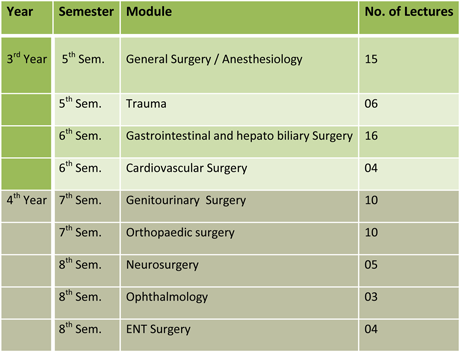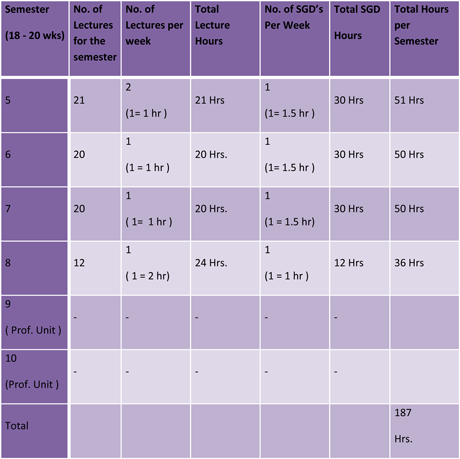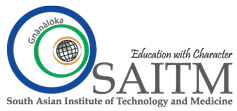ACADEMIC SURGICAL TRAINING PROGRAMME
Interactive Lectures
- All lectures are delivered with the aid of multimedia presentations
- Lecturers are strongly instructed to be interactive
- Hand outs are give onsite
- There are total of 73 lectures which are divided into 9 modules.
*All lectures are evaluated by both the students and by the faculty members on each semester
to maintain the quality of our lectures and the lecturers

Small Group Discussions (SGD)
Each lecture module is followed by a fixed number of SGD classes, which are conducted in the following manner
- Student batch is divided into small groups
- Lectures are summarized and discussed
- Q & A sessions with the lecturer
- MCQ Discussions
- Student presentations of selected important areas of the lectures
*This allows us to ensure every student has absorbed the knowledge expected, taking into consideration
different learning levels and abilities

Skills Lab Sessions
Our skills lab located close proximity to the department of Anatomy and basic sciences, is utilized to train the basic skills required by a
medical student before the exposure to ward work and operating theater procedures.
The lab uses mannequins and variety of simulation techniques for training students.
- Surgical anatomy of body parts(cadaveric)
- Simulated trauma scenarios
- Ward Procedures
- Urethral Catheterization
- Venous Cannulation
- Theater skills
- Endotracheal intubation
- Chest drain insertion
- Wound Suturing
- C-P Resuscitation
The “SIM Theater”
Students are given an opportunity to use our SIM (simulated) theater at the skills lab to simulate a real theater scenarios so
they will learn the proper techniques of:
- Operating Theater ethics and behavior
- Scrubbing
- Gowning
- Cleaning and Draping
- Patient positioning
- Theater equipment
- Anesthesia
CLINICAL SURGICAL TRAINING PROGRAMME
Surgical Training – Disciplines
- General Surgery : 02 Appointments of 6 Weeks each and 01 Professorial Appointment of 8 Weeks
- Anaesthesia : 02 Weeks
- Orthopaedic and Trauma Surgery : 04 Weeks
- Eye Surgery : 02 Weeks
- ENT Surgery : 02 Weeks
- Electives : 02 Weeks
*Other disciplines such as neurosurgery cardiac surgery and urology maybe included as electives depending on needs and availability.
Training at the Professorial Unit
Consolidation of Clinical Skills
1. Morning ward round
- For the student a typical day at the Prof. unit starts at 7.30 am preparing for the morning ward round starting at
8.00am by the Professor/an assigned consultant/Senior lecturer
- Student selected “onsite” is expected to present the patient details any given patient by the consultant acting
as a shadow house officer with a plan of management
2. Ambulatory Teaching facility [Three days/week - 200 patients/month]
- All clinic patients are provided day care beds with the facilities to be examined (with informed consent) similar to inpatients
- Histories are taken
- Examined by students
- Presented to the Prof/Sen. lecturer consultant while continuing the clinic
- At each bed side examination and demonstration of history presenting skills students are assessed and individually marked out of 10)
- Students are advised individually regarding errors and methods of improvement
3. Maintenance of theoretical knowledge [Daily MCQ Sessions]
- Student are given 20 MCQ’s daily in selected areas to be individualy done at the lunch hour(aiming to cover 700-800 stems)
- They are marked and discussed with the students after the clinical hours (after 4pm by Prof / Senior Lecturer / Lecturer)
with a background discussion
- Marks are entered in the individual assessment form
4. Operative Surgery
- Before the all surgical procedure following the case presentation by one student a brief discussion
about the procedure with a Q & A is done with the group
- Students are given the first hand experience to assist the surgeon ,perform minor procedures (eg;catheterization, cannilation,EUA)
- Live video of the procedure is telecasted to a large monitor as well as to outside lecture hall
giving access to larger student groups to learn
5. Senior clinical tutorials [Discussion on clinical case scenarios]
- Twice a week audio visually assisted curriculum based Senior ward classes with visiting senior lecturers (1-2hours)
- Carried out In the form of mock long case examination with interactive discussion
6. Weekly Saturday OSCE’s
- Individual student assessment on short cases and outpatient management
- Conducted by Prof / Senior Lecturer
- Multimedia / actor assisted teaching and assessment
- 3 cases / station covering 50 stations
7. Weekly Final MBBS Exam Simulation Sessions
- Every Saturday Prof. unit students are given a paper with
~ 50 MCQ’s
~ 6 SEQ’s
- Short Cases ( OSCE manner ) :
~ Each Saturday at least 5 students are given the opportunity to do short cases with 3 stations either by
simulation or real patients are selected from the ward.
- Long Cases (Observed History Taking) –
~Each Saturday 2 to 3 students are being examined on taking a timed history and presenting to the examiner.
METHODS OF ASSESSMENT
Formative Assessments
- Control tests: will be carried out at the end of each topic area using different methods of assessment, usually during SGD’s.
- End of appointment assessments: these will use one or more of the methods of assessment stated; Either a written exam or
viva voce examination or both
- Mini - CEX forms and DOPS forms will also form the basis of a formative continual assessment in Surgery.
- Program assessments: these will be done during and at the end of specific programs.
End of Semester (Credit) Examination (Continuous Assessments)
- The marks obtained will be carried forward to the final MBBS examination.
It will make up 20% of the final mark, which the students accumulate
Our Continuous Assessment Program for the Prof. Unit
- Daily each students progress is assessed and marked in a file from:
~ Daily MCQ’s
~ Short and long cases
~ Performance on daily ward rounds
~ Vivas done in the senior ward classes
~ Weekly OSCE’s
~ Weekly Simulated Final MBBS Exams
- Each Prof. Unit Consultant has file with each students profile where he marks his/hers marks and comments
- At the end of each week those marks are tabulated and analyzed to see the individual performance of each student in different areas
Assessments will be done using the following instruments:
Assessment of a student’s theory knowledge and literary skills
- Multiple choice Question (MCQ)
- Single Best Response (SBR)
- Extended Matching Questions (EMQ)
- True / False type questions ( T/F)
- Structured Essay Questions (SEQ)
- Objective Structured Clinical Examinations (OSCE)
- Objective Structured Long Examination Record (OSLER)
Examination Procedure
- Examination board
~ Consists of the existing faculty members of the department of surgery.
- Invigilators
~ Selected by the department and supervised by the department head.
- External examiners
~ (Invited from state / foreign universities and recognized teaching institutions)
Comments / feedback from the External examiners






